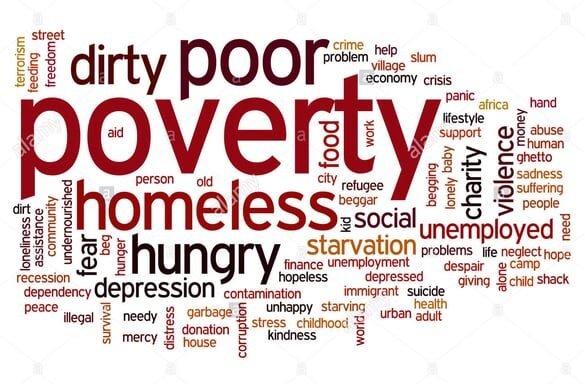Back to: CIVIC EDUCATION SS2
Welcome to Class !!
We are eager to have you join us !!
In today’s Civic Education class, We will be learning about Poverty and Its Effects. We hope you enjoy the class!

Poverty is a situation whereby an individual is unable to provide adequately for his/her basic needs. Poverty is one of the major problems of developing nations, including Nigeria. The high level of poverty in the country has placed Nigeria as one of the poorest nations in the world.
EFFECTS OF POVERTY
- Poverty can lead to increase in crime rate in the society.
- It can lead to break up in marriages.
- It can make an individual be irresponsible in society.
- It reduces the level of savings and investment in the nation.
- It increases the level of dependency in a country.
- It leads to a low standard of living.
- It can cause political apathy.
- It can heighten social vices in the society.
- It can lead to an increase in government spending in trying to attend to social needs.
- It can cause school dropout of children.
EVALUATION
- Define poverty.
- Mention seven effects of poverty.
IMPORTANCE OF EMPLOYMENT

Employment is a situation whereby an individual is engaged in a legal and economic venture that enables him/her to provide for the basic needs of life. Employment is important in the direct or indirect alleviation of poverty. Below are the importance of employment in the reduction of poverty in society.
- Employment helps to boost savings and investment in a country.
- It enables the individual to provide for his basic needs.
- It promotes economic growth and development.
- It promotes the standard of living of the people.
- It increases government revenue through tax payment.
- It reduces crime rate and social vices in the society.
- It reduces the dependency rate in society.
- It encourages popular participation.
- It enhances responsible family life.
- It promotes good planning.
POVERTY ALLEVIATION PROGRAMMES IN NIGERIA.
Over the years Nigeria has made several attempts by initiating various poverty alleviation programmes to ensure rapid growth and development of the nation. Whether or not these programmes have performed up to expectation remains a question seeking an answer. Highlighted below are some of the poverty alleviation programmes in Nigeria.
- National Accelerated Food Production (NAFP) 1972.
- Operation Feed the Nation (OFN) 1976.
- Green Revolution (GR) 1980.
- Structural Adjustment Programme (SAP), the foundation of the Better Life Programme (BLP) 1986.
- Family Economic Advancement Programme
The inability of the above programmes to deliver full result led to the formulation of National Poverty Eradication Programme (NAPEP) in 2001. NAPEP was subdivided into specific schemes:
- Youth Empowerment Programme (YES)
- Rural Infrastructure Development Scheme (RIDS)
- Social Welfare Development Scheme (SOWEDS)
- National Resources Development Scheme (NRDS)
In order to ensure the performance of these programmes, a council was established to monitor the progress of the various schemes. The council is ‘National Poverty Eradication Council’ (NAPEC).
FACTORS THAT PROMOTE GUARANTEED EMPLOYMENT
- Provision of Qualitative and Functional Education: There should be a shift from certificate-based education to practical-oriented education. This will enable school leavers to engage in economically productive ventures without waiting for jobs that are not available in the first place.
- Provision of basic infrastructural facilities that will enable businesses to thrive e.g. electricity, good road network, etc.
- Investment in Agricultural Sector: Many young people are willing to engage in agriculture provided it is made attractive like other sectors of the economy. Farmers should be allowed some level of subsidy in seedlings and be assured of a ready market for their products.
- Skill Acquisition: People should be engaged in skills acquisition programmes such as fashion designing, plumbing, baking, hairdressing, etc. These skills acquisition programmes can guarantee employment any time any day.
- Provision of Credit Facilities to SMEs: Access to soft loan facilities by Small and Medium Enterprises (SMEs) will encourage and enhance the sustainability of their businesses.
- Good Governance: Good governmental policies and programmes that are directed at business growth will ensure guaranteed employment. People will be willing to get engaged when they are sure that public policies will favour their businesses.
EVALUATION
- Define poverty.
- Mention six importance of employment.
GENERAL EVALUATION
- Define political party.
- State three characteristics of a political party.
- Define the constitution.
- State four importance of the constitution.
- What is a human right?
READING ASSIGNMENT
Poverty and its Effects – Fundamentals of Civic Education for SS Book 2, Sola Akinyemi, Pages 22-26.
SECTION B
- Explain 6 effects of poverty.
- State five factors than can promote guaranteed employment.
We have come to the end of this class. We do hope you enjoyed the class?
Should you have any further question, feel free to ask in the comment section below and trust us to respond as soon as possible.
In our next class, we will be learning about Political Apathy. We are very much eager to meet you there.

It teaches me alot
We’re glad you found it helpful😊 For even more class notes, engaging videos, and homework assistance, just download our Mobile App at https://play.google.com/store/apps/details?id=com.afrilearn. It’s packed with resources to help you succeed🌟